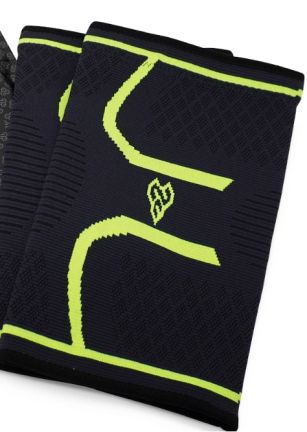Can Knee Sleeves Help Reduce Pain from Injuries?

Support wear such as knee sleeves for runners and other sportspeople can make a considerable difference in reducing pain from existing or new injuries. It is not uncommon for athletes to sustain knee injuries in the course of their sporting activities, and the anatomically shaped knee sleeves can provide them with the necessary support, compression, and warmth to make a quicker recovery. However, for best results, you do need to pick the right knee sleeves.
Here’s what you need to know about finding knee sleeves to help reduce the pain from sporting injuries:
The knee sleeves must be of the right size
Most knee sleeves are of flexible, stretchable materials, and so you can tug and adjust them to an extent to fit snugly around your knee. However, you must pick a sleeve that is of the exact size of your knee or at least is in its close neighborhood. If it is too big, it will be loose and liable to slide down. If it is too tight, it could cut off your circulation and lead to more health problems. Look for comfortable knee sleeves for runners.
You can get accurate measurements by measuring the distance from your knee cap to four inches above on your thigh. You can then take the thigh circumference at that point, and compare that measurement with those on the manufacturer’s chart. Each manufacturer may have a different measurement chart, so you need to do this little exercise every time you buy new knee sleeves. From the chart, pick the knee sleeves that are the closest to your size.
The knee sleeves must be of the right thickness
Knee sleeves are available in 3 mm, 5 mm, and 7 mm thicknesses. The thicker the knee sleeve, the better the support you can expect to get. If you are into endurance sports and long-distance running, you may only need light protection to support your knees when your energy starts to flag. A 3 mm knee sleeve is perfect for that and will not hamper the smooth movements of your limbs. For more challenging activities like running marathons and doing gym workouts, you will do well to get 5 mm knee sleeves. On the other hand, you will require thicker knee sleeves for better support during heavy-duty sports activities like weightlifting. For those, get the 7 mm knee sleeves.
The knee sleeves must be of the right material
If you need to wear knee brace or sleeves, you are probably going to wear them for long hours or maybe even overnight. In that case, you want knee sleeves that are of breathable materials. The most common materials for knee sleeves are cotton and other fabrics, neoprene, and silicone. Many manufacturers now use 3D knitting technology to make knee sleeves that are softer and more stretchable and can offer additional support. These sleeves are also better at staying in place as they come equipped with silicone anti-slip waves and bands. You can wear them all day and all night or during intensive workouts, and the sleeves will remain dry, odorless, and comfortable.
The knee sleeves must offer the right protection
Depending on your support requirements, you can get knee sleeves in one to three plus protection levels. The level one designation is for mild to moderate support for pain relief while maintaining an active lifestyle. If you suffer from health conditions like tendinitis, bursitis, and arthritis, wearing a level one knee sleeve will help keep your limbs flexible.
The level two knee sleeves have supportive straps that you can tighten as needed. The straps make them somewhat inflexible, but you won’t be hampered too much in your movements. Get these sleeves if you suffer from chronic conditions, ligament issues, tendinitis, or sprains.
As the bulkier level, three sleeves come with hinges, you can expect better support for your joints. However, you will have limited movement. These sleeves are generally worn after surgeries to stabilize the knee, keep the joint warm and compressed, and speed up the recovery process.
By wearing the right knee sleeves, you can obtain pain relief from sporting and non-sporting injuries and get adequate joint support to facilitate your movements and aid with your speedy recovery.
